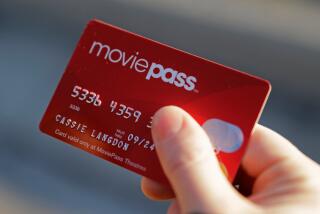Discounts on movie tickets make theaters uneasy
At a cinema in San Francisco, about 100 people recently showed up for a free screening of “Transformers: Dark of the Moon” and a presentation of a kind of Netflix for movie theaters.
The service, called MoviePass, would allow consumers to watch all the movies they want for a $50 monthly fee, using their smartphones to download codes that could be redeemed for tickets at theaters. With the backing of AOL Ventures, the New York start-up had planned a national rollout of the service this fall with online ticket firm MovieTickets.com.
But before a single pass was sold, AMC and other theater chains blasted MoviePass, saying they were blindsided and would not honor the pass.
“Plans for the program were developed without AMC’s knowledge or input,” Stephen Colanero, AMC’s chief marketing officer, said in a statement.
The proliferation of steep discounts on movie tickets is causing much anguish in the exhibition industry.
In theory, theaters stand to benefit from promotions if they bring in more customers who buy lots of popcorn, soda and other high-profit concessions. And with most promotions, theaters still get the full ticket price because third parties cover the cost of the discounts.
Even so, some exhibitors fear the heavy marketing of low-priced tickets through discount services such as Groupon, LivingSocial and DailyCandy will erode their business by encouraging moviegoers to wait for a bargain before trekking to the megaplex.
Some draw parallels to the effects that low-cost online video rental companies Netflix and Redbox have had on the slumping DVD business.
“There is always a worry about devaluing your product,” said Patrick Corcoran, spokesman for the National Assn. of Theatre Owners.
Exhibitors can ill afford that, given that attendance — the number of tickets sold — is down about 5% this year compared with the same time in 2010 and has been flat for much of the last five years. Exhibitors have also expressed alarm that studios’ plans to release movies via video on demand just eight weeks after their theatrical release will further erode their business.
For some theater owners, it’s a matter of control. “I just don’t want third parties setting our ticket prices,” said Ted Mundorff, chief executive of Landmark Theatres, the chain co-owned by Dallas Mavericks owner Mark Cuban. “We want to run our own business.”
Representatives of AMC, Regal and Cinemark all declined to comment. Some of the large chains do sell blocks of discounted tickets to Web retailers like Pasadena-based Goldstar and offer their own rewards programs. AMC, for example, recently launched a program called AMC Stubs: Customers who pay an annual fee of $12 receive rewards they can use toward tickets and concessions, based on how much they spend in the theater.
Not surprisingly, movie ticket deals offered through websites like Groupon and DailyCandy are popular among consumers, especially in the current economic climate, when people are cutting back on discretionary spending and ticket prices are rising. The average ticket price in the U.S. was $8.06 in the second quarter of this year — the highest level on record — according to the theater association.
Industry executives argue that going to the movies remains a relatively inexpensive form of entertainment and that ticket prices, when adjusted for inflation, are still lower than what they were in 1970. Still, some industry analysts believe that rising ticket prices, largely fueled by surcharges from 3-D films, are helping drive down movie theater attendance and making consumers more hungry for deals like MoviePass.
“It’s something that could be very popular for consumers, but I’m not sure about exhibitors and studios because it’s changing the economics of the industry,” said Wade Holden, an analyst with the research firm SNL Kagan. “They don’t want to see customer expectations of pricing become lowered.”
Studios are barred under federal antitrust laws from being directly involved in setting ticket prices. But that hasn’t stopped them from using ticket promotions to help market their movies. In March, for example, Lionsgate joined with Groupon to launch a 48-hour deal offering discounted tickets for “The Lincoln Lawyer” in what the studio said was the first of its kind.
Groupon sold 190,000 tickets through its promotion a few days before the film’s opening in March. Consumers paid $6, about half the regular price in big cities like New York and Los Angeles. Lionsgate, which partnered with online ticket service Fandango to handle the transactions, paid the difference to theater owners, viewing it as a marketing expense. Lionsgate executives credit the promotion for helping to deliver a strong $13-million opening weekend for the film starring Matthew McConaughey.
“It was a very efficient way for us to reach our audience and to create an awareness for the movie,” said David Spitz, executive vice president of theatrical distribution for Lionsgate.
Spitz said such discounts aren’t suitable for every movie, but the studio would consider similar promotions in the future. “A lot of our customers are encouraging us to do things like this because it’s driving people into the cinema,” he said.
This month, Universal Pictures offered $6 tickets to see “The Change-Up,” the R-rated comedy starring Jason Bateman and Ryan Reynolds. The studio joined with DailyCandy Deals, the online newsletter owned by Universal’s parent company Comcast Corp. that offers deals on restaurants, boutiques, spas and now movies. Universal did a similar promotion for its raunchy comedy “Bridesmaids.”
Although the latter was a big hit, “The Change-Up” fared poorly, notwithstanding the DailyCandy promotion. Still, Meredith Howard, spokeswoman for DailyCandy Deals, said the movie discount deals have been very popular.
“It allows us to reach a new subscriber base,” she said. “And studios can align with our audience, so it’s mutually beneficial.”
Meanwhile, the owners of MoviePass haven’t abandoned their plans. The company recently partnered with Hollywood Movie Money, which provides promotional movie tickets and has long-standing relationships with the major theater companies in the U.S., said Stacy Spikes, a former Miramax executive and co-founder of MoviePass.
Ron Randolph-Wall, CEO of Quantum Rewards, which operates Hollywood Movie Money, noted that the MoviePass model would be a way to get more people to see a movie. “This makes so much sense for everybody,” he said.
Details are still being ironed out, the executives said, but the concept would be similar to the previous model. Customers would pay a monthly fee to watch an unlimited number of movies at theaters, only they wouldn’t have to rely on their cellphones to buy tickets. The ticket vouchers would be supplied by Hollywood Movie Money, which would pay theaters the full admission price.
As for the flap with AMC and other exhibitors in June, Spikes said AMC executives did not return his calls when he left messages to discuss the program. He said executives at MovieTickets.com assured him that he did not need theater owners’ approval before launching a test. AMC officials declined to comment.
In a statement, executives at MovieTickets.com said the MoviePass program did not meet the company’s standard operating guidelines for promotional code programs but did not specify how.
Spikes said he was confident that he could avoid another conflict with theater owners because Hollywood Movie Money has long-standing ties with them.
“This is far from being proven as a successful business, but we know there are a lot of people who want to sign up for this,” he said.
More to Read
The biggest entertainment stories
Get our big stories about Hollywood, film, television, music, arts, culture and more right in your inbox as soon as they publish.
You may occasionally receive promotional content from the Los Angeles Times.











